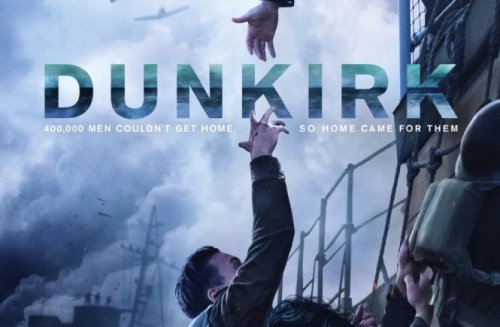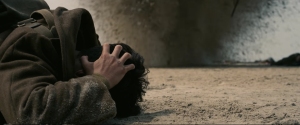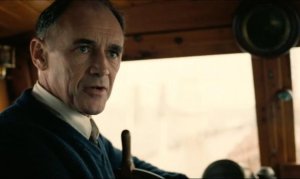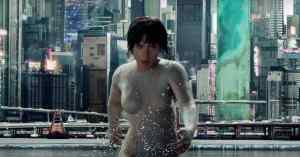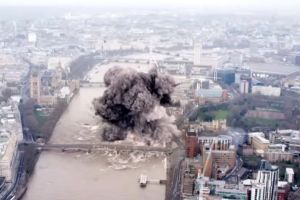Star Rating: 4/5
Director:
- Christopher Nolan – Memento, Insomnia, The Prestige, Inception, The Dark Knight I-III, Interstellar
Cast:
- Fionn Whitehead – The Children Act, Caravan
- Aneurin Bernard – The Facility, The White Queen, War & Peace, Interlude In Prague, Dead In A Week
- Barry Keoghan – Love/Hate, ‘71, Trespass Against Us, Black 47
- Mark Rylance – Richard II, The Other Boleyn Girl, Wolf Hall, Bridge of Spies, The Kidnapping of Edgardo Mortara
- Tom Hardy – Inception, Tinker Tailor Soldier Spy, Warrior, This Means War, The Dark Knight Rises, The Drop, The Revenant, Venom
- Tom Glynn-Carney – The Last Post
- Jack Lowden – ‘71, War & Peace, A United Kingdom, Denial, Mary Queen of Scots
- Brian Vernel – Offender, The Last Kingdom, Star Wars VII: The Force Awakens
- Kenneth Branagh – Wild Wild West, Harry Potter and the Chamber of Secrets, Valkyrie, My Week With Marilyn, Murder On The Orient Express
- Cillian Murphy – Girl With A Pearl Earring, The Dark Knight I-III, Inception, Transcendence, The Delinquent Season
- Harry Styles – One Direction: This Is Us
Music Composer:
- Hans Zimmer – The Lion King, Pirates of the Caribbean I-IV, Inception, The Dark Knight I-III, Man of Steel, 12 Years A Slave, Interstellar, Batman v Superman: Dawn of Justice, Blade Runner 2049
When one looks at the generation that survived World War II (WWII), one can only admire the heroism and sacrifice they demonstrated. It was an extraordinary generation, of the like we may never see again. Christopher Nolan’s latest film, Dunkirk, underlines their astonishing character.
Dunkirk is about the miracle evacuation of over 300,000 Allied soldiers over nine days between May and June 1940 as the Nazis blitzkriegged their way through Holland, Belgium and into France. The film focusses, predominantly, on three people: Tommy (Fionn Whitehead), a British soldier, on the beaches of Dunkirk doing his utmost to get on a boat to sail back to Britain; Mr Dawson (Mark Rylance), a resident of Dorset, who answers the Home Guard’s call for anyone with a fishing boat or a yacht to brave their way to Dunkirk to help bring soldiers home; and Farrier (Tom Hardy), a fighter pilot who shoots down German planes over the Channel. It is through these characters that we gain an understanding of what it was like to be at Dunkirk at the time.
Christopher Nolan recreates the situation in and around Dunkirk brilliantly. 300,000 Allied men are stuck on the beaches of north-east France with no way of getting home. It is through Tom Hardy’s and Mark Rylance’s characters that we appreciate the heroism that ordinary folk showed. Statistically, one in three RAF planes were shot down by the Germans during WWII, yet Hardy’s character shows no fear and does his duty as if it were expected of him. Similarly, Rylance’s character knows full well that he (and his son) could be bombed or torpedoed by the Germans, yet he still gets on his little yacht and sails to France to save as many soldiers as he can. It is inspiring to watch. (Compare them to people today, where a keyboard warrior would most likely tweet #saveourboys and believe he/she has done their bit for the war effort, and we realise how far we have fallen in a mere two or three generations.)
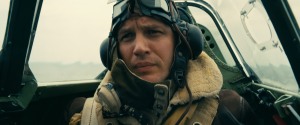
Farrier (Tom Hardy), seemingly representing the token force of the Royal Air Force (RAF) all on his own, doing his utmost to save the lives of Allied soldiers by shooting down German planes.
Just as Nolan captures the heroism of the age expertly, so too does he capture the tension of the situation at Dunkirk equally well. One’s muscles tauten as viewers grasp the magnitude of the difficulty the British government faced in trying to rescue 300,000 men in a very finite time (especially with German bombers flying overhead and the fear of a battle for the British Isles still to come). Compound it with yet another superb and gripping score from Hans Zimmer, and the film is unbearable to watch for the entirety of its 107-minute run time. From the rapidly increasing beat of a pulse; to the head-splitting screech of a German bomber; to the nerve-jangling play of the strings; to the ever loudening, conflicting musical verses, layering each other, the music induces the viewer with the intolerable anxiety, panic and terror that the Allied soldiers must have felt back then.
This is quite a feat for Nolan to achieve and it makes up for Dunkirk’s shortcomings: notably, the lack of context, the lack of character development, and the virtual lack of horror. First, by the end of the film, it is not apparent how or why 300,000-400,000 Allied soldiers ended up at Dunkirk in May 1940. Commander Bolton (Kenneth Branagh) would have been the perfect person to elucidate upon this, but he doesn’t.
Second, with the exception of Rylance’s remarkable character, the characters are not given a backstory and are under-developed. Consequently, viewers feel little for the characters (many of whom audiences won’t be able to name or tell apart). This is in stark contrast to other war films, such as Saving Private Ryan (SPR) and Platoon, in which character development is central to the plots.
Third, because Nolan (or the studio) chose to go for a mass market appeal, Dunkirk lacks the grittiness (again) of SPR and Platoon. As a result, one does not see the horrific wounds soldiers suffered in Dunkirk and this takes an element of authenticity away from the movie. By comparison, the opening sequence of SPR is authentic because it reveals the horrors of war. If Spielberg had failed to show the blood, the wounds and the screams as the Allies stormed the Normandy beaches, SPR would not have achieved the iconic status it has since achieved.
Over-all, Dunkirk is another excellent Christopher Nolan film. Yes, it lacks explanation about why the situation at Dunkirk arose; it lacks character depth; and it lacks visceral qualities by not showing audiences raw wounds. Nevertheless, Dunkirk gives viewers a genuine experience of what it was like to be at Dunkirk in May 1940 and illustrates the heroism that the (extra)ordinary people of Britain demonstrated to help evacuate the Allied soldiers. When one examines the courage of the people back then, as highlighted by Mark Rylance’s character in particular, one cannot help but be awed and overwhelmed by how great they were.
PG’s Tips

